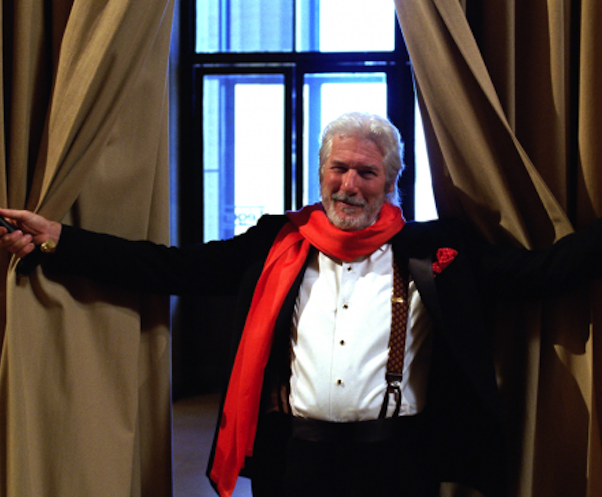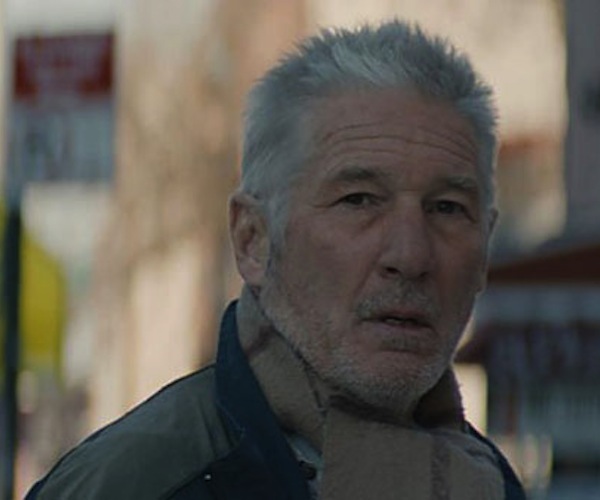Film Review: At the Maine International Film Fest — Richard Gere Day
The MIFF offered two new films starring Richard Gere in atypical roles for the prolific actor.

A scene from “Franny,” starring Richard Gere.
By Paul Dervis
Sunday was Richard Gere day at this year’s Maine International Film Festival (through July 19): the prolific actor starred in two decidedly atypical Gere movies. Wedged in between these showcases was a new, locally filmed music video written and directed by MIFF favorite Ernest Thompson, the writer of On Golden Pond as well as West Side Waltz. Thompson has been running an Artist Collaborative in New Hampshire for the last several years.
“Your Are Loved” was conceived as a love poem for Thompson’s wife, Kerrin, but it has developed into so much more. Using locals, who draw heart images on paper and in the air, the song, performed by singer/composer Justin Jaymes, starts off with a small child putting a paper heart in a bottle and then tossing it off the coast of Maine. Eventually, the message finds its way into the open guitar case of a street performer, but not before it has travelled from one person to yet another. It is quite an affecting portrait of the good in all of us.
Also, a shout out should go to my critical partner in crime here at the Arts Fuse, Gerald Peary, whose documentary Archie’s Betty, had a heralded screening to close out the first weekend in Waterville. Kudos, Gerry.
But back to Gere. The afternoon started with writer/director Andrew Renzi’s Franny, a dark look at the shattered life of a man haunted by the tragic outcome of what was meant to be an innocuous action.
Renzi directed last year’s documentary Fishtail, which also played at the MIFF; this is his feature film debut. Franny is decidedly uneven, but Renzi manages to pull out an ‘in your face’ performance from Gere, who normally is very understated. The sight of a goosed-up Gere works…up to a point.
Gere plays Franny, a philanthropist who helped build a major Medical Center in Philadelphia where his college buddy and his wife (whom Franny had long coveted) work, but on a drive into town from his friend’s house, Franny lights up a joint and then goofs around; he inadvertently causes an accident that kills the couple.
Flash forward five years. Franny is still stinking rich and a major board member at the hospital, but has turned into a drug-addled hermit, except for the occasional visit to the children’s ward.
Enter Olivia (Dakota Fanning), the dead couple’s now grown daughter, who, with her doctor-husband, is moving back to the City of Brotherly Love. Her return rejuvenates Franny, who gets the young intern a position at the hospital and proceeds to showers unwanted gifts on the couple.
You see, Franny is attempting to recreate the ‘Three Musketeers’ life he had shared with Olivia’s folks. But it’s not working. Gere is livelier than usual as he attempts to develop a Lear-like character who is working far too hard to make up for past wrongs .. and he almost pulls it off. But, all too frequently, the wooden Gere pops out and scuttles the performer’s forays into animation.

A scene from “Time Out of Mind,” starring Richard Gere.
In Time Out of Mind Gere fares far better. An ambitious and, dare I say, artistic work, Gere himself produced the film, which offered him a chance to play totally against type. Abandoning a musical soundtrack and opting instead for the random street sounds and conversations of passers by, Time Out of Mind follows George, a down-and-out fellow on the fast track to homelessness. George is not entirely sure how he got to this null point, aside from his obvious failures: absentee father, disconnected husband, poor worker, and determined alcoholic. He’s been sleeping on friend’s couches, but his contacts are running out. Never having sought public assistance before, and increasingly confused mentally, George tries, with little success, to navigate the system.
It is not a kind world that this aging man is trying to survive in. And he makes it worse; when anyone reaches out to him, George becomes more remote and suspicious. He does know where his daughter is, but she has been burned too often to offer much help now. There is a heartbreaking scene where she gives him a few bucks and then tells George to get lost. He takes the money because he clearly can no longer afford pride.
Gere is solid as the hapless George. He blends fear and sadness in just the right portions as he conveys the lonely tedium of staggering through each exceedingly long day. Characters flow in and out of the narrative, much as they do in life itself, adding a powerful feeling of randomness and loss. Among the supporting cast members, Ben Vereen gives a stellar performance as a street person who latches on to George.
Time Out of Mind was directed by Oren Moverman from a story by Jeffrey Caine, but this is is very much Gere’s film. It isn’t perfect by any means; it could have been a half hour shorter and the ending was a bit too contrived. But if you want to take a serious look at Richard Gere, here is where to look. You will be glad you did.
Paul Dervis has been teaching drama in Canada at Algonquin College as well as the theatre conservatory Ottawa School of Speech & Drama for the past 15 years. Previously he ran theatre companies in Boston, New York, and Montreal. He has directed over 150 stage productions, receiving two dozen awards for his work. Paul has also directed six films, the most recent being 2011’s The Righteous Tithe.
Tagged: Archie's Betty, Franny, Maine International Film Festival, Paul Dervis, Richard Gere, Time Out of Mind
